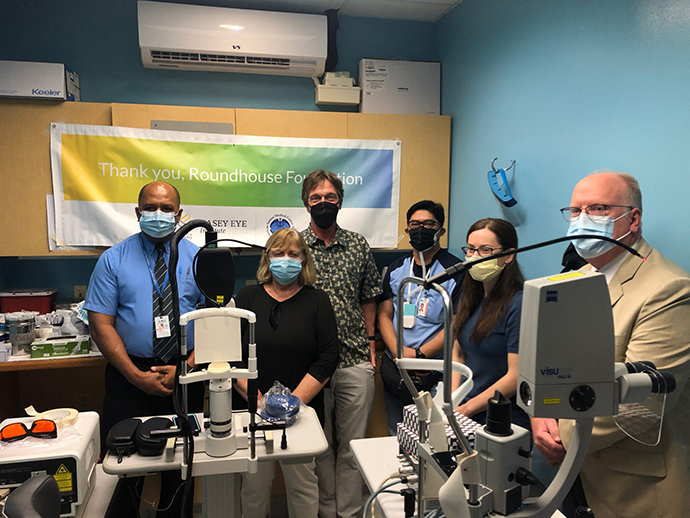
About 2,500 miles from its nearest neighbor, Hawaii, American Samoa is as remote as it gets. That’s generally a good thing – think pristine beaches and tight-knit communities – unless you need specialized eye care.
Even something as simple as a cataract can turn into a major event, when you have to hop on a plane for treatment.
“People are flying to Hawaii for a 15-minute laser procedure to remove cataracts. On their own dime,” said Mitch Brinks, M.D., M.P.H., associate professor of ophthalmology and director of the Casey Outreach Program, who has worked extensively in the region. “If they can’t afford the airfare, they risk losing their sight.”
Much like in rural Oregon, specialized health care providers are few and far between in American Samoa. With the help of Casey’s International Ophthalmology Program, however, this remote US territory is ramping up its eye care infrastructure and ability to detect, prevent, and treat the most common eye diseases.
In February, a team led by Casey’s Kellyn Bellsmith, M.D., assistant professor of ophthalmology, Allison Bradee, M.D., pediatric ophthalmology fellow, and Dr. Brinks spent a week in American Samoa building a pediatric screening program and improving the equipment and training available for adult eye care.
Delivering sight-saving care to kids
The pediatric vision screening program consisted of three parts: meeting with local partners to assess local strengths and barriers to pediatric vision care, training volunteers and public health staff on how to use the PlusOptix photoscreener, and completing comprehensive dilated eye exams for children referred from the screening.
The team screened 220 children aged 3-7 at 3 elementary schools. Out of those screened, 59 children (27%) were referred for a more complete exam. Among the children examined, 74% needed glasses and 9% needed urgent referral to the local ophthalmologist for ongoing care.
Dr. Bellsmith emphasized the significance of what they found in the screenings. “If you extrapolate our results to all kids in that age group, it means 16% of them can't see as well as they could. That's a huge group of the population at risk for educational issues, because they can’t see everything that they need to see to develop and grow.”
The team from Casey collaborated closely with the Department of Health in American Samoa, the Lions Club of American Samoa, a local optometrist Dr. Laloasi Petaia-Steffany, and ophthalmologists at LBJ Hospital, Dr. Ben Siatuu, Dr. Jose Tana and Dr. Solafi Laititi..
“It was wonderful to be working with all of these local partners who share the Elks Children’s Eye Clinic’s mission. It was really evident how much they want to make life better for their kids, and satisfying to help them reach that goal,” said Bellsmith. She also noted that the screening program went so well that, by the first half day, local partners were training their fellow volunteers to use the equipment.
Cultivating home-grown expertise
Another primary goal of the trip was to increase the island’s capacity to treat cataracts and detect diabetic retinopathy in adults, two common conditions that can cause vision impairment if left untreated.
“We talked to the hospital board and many other health care providers, and they told us that ophthalmology is one of the top specialties requiring off-Island referrals – mostly because of complicated cataract surgery and diabetic laser treatment,” said Brinks.
Now, thanks to the generosity of The Roundhouse Foundation and retired orthopedic surgeon Dr. James Gebhard, the Casey team was able to provide the training and equipment that will make it possible for local providers to treat these common conditions themselves. The Roundhouse foundation donated an Iridex Argon Laser - the best model available for treating conditions like diabetic retinopathy. Dr. Gebhard donated a phacoemulsification cataract surgery machine. Gebhard’s son, ophthalmologist Dr. Nate Gebhard, who works in Casey’s Hood River clinic, donated his time to train volunteers.
“It’s gratifying to see such clear results. The benefits of these simple interventions – new equipment, screening and training – will ripple through the entire community,” said Kathy Deggendorfer, Founder and Trustee of The Roundhouse Foundation, who accompanied the Casey team on this trip.
“Working in American Samoa makes sense on so many levels,” said Brinks. “They are a U.S. territory and I think we have an obligation to bring them up to mainland eye care standards. They are also incredibly cooperative and welcoming, and that makes it possible to really achieve something.”